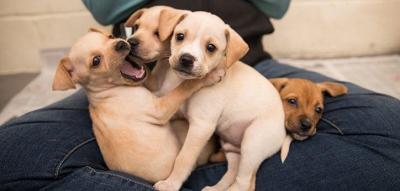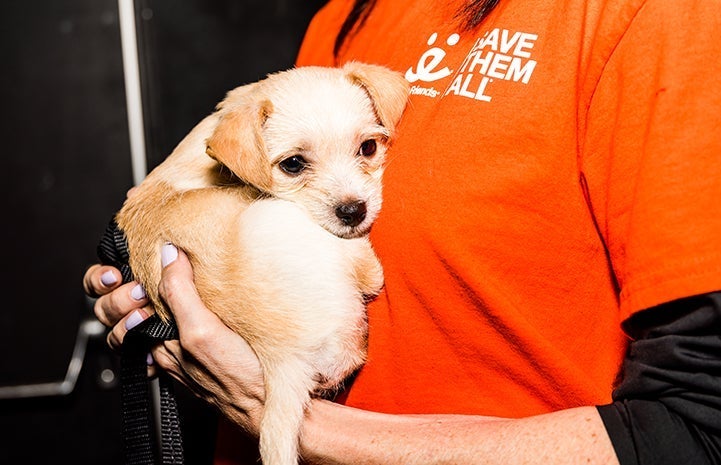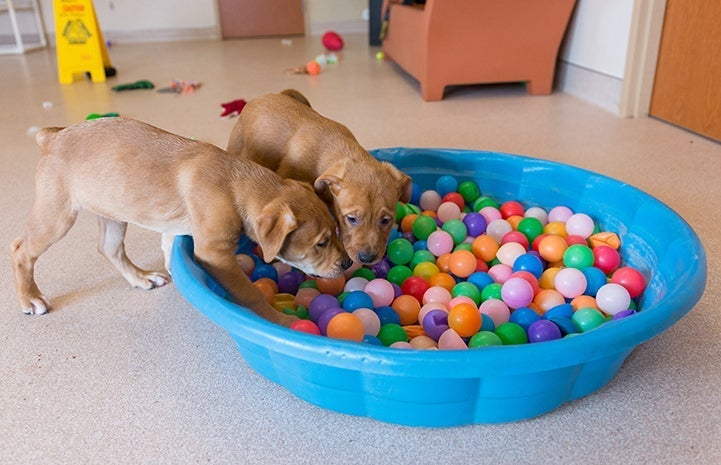
Puppy Development Stages From Birth to 2 Years Old
To help new puppies grow up happy and healthy, it’s important to be aware of what they need in all the puppy development stages. Here's a breakdown of each stage of puppy development, starting at birth up to 2 years old.
Birth to 2 weeks old: Neonatal stage and dependence on mother
From birth to 2 weeks old, puppies are completely dependent on mom for food and care, such as keeping themselves clean. The senses of touch and taste are present at birth. Neonatal puppies have limited movement and are capable of only a slow crawl.
2-4 weeks old: Transitional stage and development of senses and weaning
From 2 to 4 weeks, puppies become aware of and interact with their litter mates as well as their mother. Their eyes open, and their sight is well developed by 5 weeks. The senses of hearing and smell are developing, and their baby teeth start emerging. During this puppy development stage, the pups begin to walk, bark, and wag their tails. By the end of this period, puppies are able to eliminate without their mother’s stimulation.
Weaning from the mother also begins during this phase. At around 3 weeks, puppies should be started on solid food. Offer the puppies small amounts of soft food in a shallow dish. By the time the puppies are 8 weeks old, they should be eating solid food and no longer nursing.

3 to 16 weeks old: Training, vaccinations, and socialization
From 4 to 6 weeks, puppies continue to be influenced by their mother and litter mates. They learn to play, gaining needed social skills from litter mates, such as inhibited biting (biting to play, not to hurt). The puppies also learn the ins and outs of group structure and ranking within the group. Puppies become much more vocal during this period, with the appearance of play barking and growling.
At this point, if mom is aggressive or fearful of people, the puppies might be affected by her attitude. To socialize your puppies to humans, have a variety of people (in all shapes, sizes, genders, ages, etc.) interacting with them. During the socialization period, it’s also very important to expose your puppy to other normal experiences, such as car rides, crate-training, vacuum-cleaning, ringing doorbells, and a variety of objects and sounds. In addition, handling of the feet and body parts is a good thing for a puppy to experience at an early age.
Home starts with you
Training and socialization can begin very early, from the beginning of this puppy development stage, but do not permanently separate puppies from their mother and siblings before 8 weeks old. House-training can begin as early as 5 weeks old, when puppies will follow their mother through a dog door or can be taken out for elimination lessons.
At approximately 6 weeks, puppies can begin in-home training. You should handle all parts of the puppy, introduce their first collar and lead, encourage them to come using their name, and reward them with praise and treats. At this age, you can also start training puppies with positive reinforcement methods: using a clicker, praise, and rewards.
Note that at about 8 weeks, puppies start experiencing fear; everyday objects and experiences can alarm them. This is a perfectly normal reaction — it doesn’t mean that you will have a fearful dog.
You don’t want to socialize your puppies with other dogs and cats until the puppies have been vaccinated because they can pick up diseases (such as parvo, distemper, and hepatitis) that can be fatal to puppies. In general, about a week after the second parvo/distemper vaccination, it is reasonably safe for your puppy to play with other similarly vaccinated puppies in a class with a relationship-based dog trainer. Ask your veterinarian for information pertaining to your individual puppy and whether they know of any parvo or distemper outbreaks in your area.
Puppies can socialize with other species of animals as well — horses, cats, whatever animals you would like your puppy to be comfortable around. Of course, you’ll need to use caution and make sure that the other animals are friendly.

4-6 months: Establishing hierarchy within the group
During this period, puppies grow rapidly, and you might notice daily changes. Even though puppies are very energetic, don’t exercise your puppy too much because they can overdo it.
Among themselves, puppies begin to use ranking in their group structure — that is, they start testing where they fit in. Puppies might experience another fear phase that lasts about a month and seems to come from nowhere. Again, this is a perfectly normal part of puppy development and is nothing to be alarmed about.
6-12 months: Adolescent stage and continued training and socialization
Like most adolescents, puppies are very rambunctious. So continue the process of training and socializing your dog during this phase. Socialization and training are necessary if you want your puppy to be comfortable and act acceptably in public places, such as dog parks and beaches, or anywhere that the pup will meet new dogs and new people.
1-2 years: Social maturity and ongoing training
By this age, your dog has reached adulthood, but changes in social preferences and habits can occur up to 2 years of age. Ongoing training will ensure a respectful and fun relationship between your dog and all human family members, which makes having an animal in the family a daily pleasure.
